by Shadab Zeest Hashmi
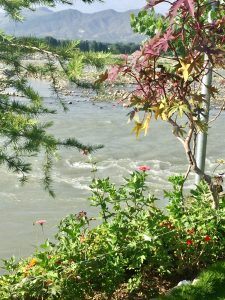
The most stunning memory of Swat valley that remains with me since my first visit as a child is the euphoria of the headstrong Darya e Swat, the luxuriously frothy river, like fresh milk churning and churning joyfully. That, and the first time I heard the pristine and full silence of wilderness, meandering along languorous brooks and spotting the smallest wild flowers I had ever seen. Like any child, scale impressed me: the mountains were the highest, the river the fastest, the silence of the trails the deepest I had yet experienced. If there was anything subtle I may have observed, the awe of scale and novelty eclipsed it completely.
On my visit to Swat this year, I tried to recapture that spirit of childhood, trying to set the senses free as well as refining them with the subtlety that was beyond the capacity of my younger self, wrestling furiously against the disquiet and frustration Swat evokes due to recent political events. It struck me that subtlety still eludes the perception of Swat as far as the global psyche goes, dominated as it is by narratives of scale: the most unsafe place in the world, the worst place for women and education, home of the youngest person to receive the Nobel prize, etc.
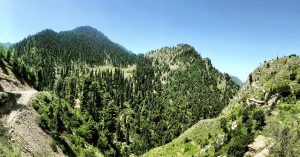 Those of us who have witnessed the cranking of the war-machine in the dissemination of half-truths and falsehoods in print, on screen, in the manufacture of celebrity, must reclaim for ourselves our own eyes and ears, our faith in what we know to be the truth about the culture we come from— not easy when over-simplification and lies-by-omission become standard practice/perception and therefore the “truth,” when subtlety is drowned out by sensationalism. The test came for me when I received a blurb request for a book of poems that was sympathetic to Malala and her cause while exposing ignorance of the full historical and political context of Malala’s story; the author conflated sentiments in response to what was actually a brief period of Taliban-rule in a small area of Pakistan, with the entire country and culture, coming across as if girls have never had access to education in Pakistan. In my letter to the publisher who had requested remarks of praise for the book, I wrote that I respected the author’s compassion and mastery of craft, but I could not endorse a work that perpetuated the falsehood (even if only by insinuation) that women in Pakistan are not allowed to go to school. As someone indebted to the learning received from my grandmothers, one of them a college professor, and from women mentors and teachers who were aware and proud of their Muslim heritage of women thinkers (rulers and mystics such as Rabia Basri, Fatima al-Fahri, Razia Sultana, and the first Pakistani woman to run for office, Fatima Jinnah, the sister of the nation’s founder), I could not participate in supporting a book with a focus so myopic and misleading as to be itself contradictory to the idea of education as a source of broadening the mind. A work enacting the pigeonholing that education is supposed to train the mind against, was a betrayal of my values.
Those of us who have witnessed the cranking of the war-machine in the dissemination of half-truths and falsehoods in print, on screen, in the manufacture of celebrity, must reclaim for ourselves our own eyes and ears, our faith in what we know to be the truth about the culture we come from— not easy when over-simplification and lies-by-omission become standard practice/perception and therefore the “truth,” when subtlety is drowned out by sensationalism. The test came for me when I received a blurb request for a book of poems that was sympathetic to Malala and her cause while exposing ignorance of the full historical and political context of Malala’s story; the author conflated sentiments in response to what was actually a brief period of Taliban-rule in a small area of Pakistan, with the entire country and culture, coming across as if girls have never had access to education in Pakistan. In my letter to the publisher who had requested remarks of praise for the book, I wrote that I respected the author’s compassion and mastery of craft, but I could not endorse a work that perpetuated the falsehood (even if only by insinuation) that women in Pakistan are not allowed to go to school. As someone indebted to the learning received from my grandmothers, one of them a college professor, and from women mentors and teachers who were aware and proud of their Muslim heritage of women thinkers (rulers and mystics such as Rabia Basri, Fatima al-Fahri, Razia Sultana, and the first Pakistani woman to run for office, Fatima Jinnah, the sister of the nation’s founder), I could not participate in supporting a book with a focus so myopic and misleading as to be itself contradictory to the idea of education as a source of broadening the mind. A work enacting the pigeonholing that education is supposed to train the mind against, was a betrayal of my values.
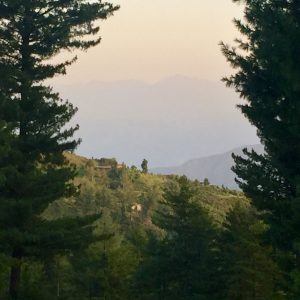 On the one hand, I feel pride in the person of Malala, her intelligence, courage, and vision, and on the other, anger at witnessing how her story has been appropriated and reduced for propaganda, her own words censored wherever they don’t fit the agenda of justifying war without end. Is Malala a hero? Yes, she is. But so are numerous other young Pakistani women and men who have risked their lives for their principles in a very difficult time, who have begun movements for education and social justice, even given their lives (as Aitzaz Hasan and Mashal Khan) fighting violent extremism, or being in the crossfire between terrorists and the war on terror.
On the one hand, I feel pride in the person of Malala, her intelligence, courage, and vision, and on the other, anger at witnessing how her story has been appropriated and reduced for propaganda, her own words censored wherever they don’t fit the agenda of justifying war without end. Is Malala a hero? Yes, she is. But so are numerous other young Pakistani women and men who have risked their lives for their principles in a very difficult time, who have begun movements for education and social justice, even given their lives (as Aitzaz Hasan and Mashal Khan) fighting violent extremism, or being in the crossfire between terrorists and the war on terror.
Years ago, before coming to the United States as a college student, I accompanied my mother to Swat on her documentary-making trip. She had recruited me as a translation voice-over; the interviewees in her film (about self-employed women) spoke Urdu or Pushto, the voice-over for her film, commissioned by UNICEF, was in English. I was a preoccupied teenager, not impressed by anything, quite used to giving my mother half-hearted help in her projects. On that trip in 1992, I met women who ran schools, tailoring shops, “tandoors” (where bread is baked and sold), and so on. I was aware of the struggles of both women and men in our third world country, and thanks to my mother’s activism as well as my father’s, I was especially aware of the challenges of underprivileged women. In all honesty, this interested me as little at the time as the scenic beauty of Swat I had been so taken in by as a child. The world was big and I was ready for an adventure of my own.
My latest trip was different. I wanted this place to speak to me as an old friend, to separate the grain from the chaff of my spirit, to remind me who I was before the burnout of grownup life, before the exhaustion of raising Muslim children in America, teaching them to have patience with a world that was suspicious of us merely for existing, to value culture but be wary of tribalism in a time when divisive rhetoric was gaining currency and tribalism and polarization were becoming the norm.
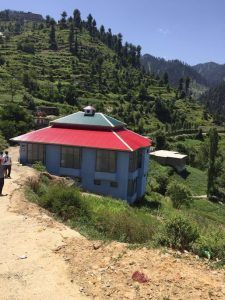 Revisiting Swat, I wanted to heal from our abrasions, to be in tune with the spirit of childhood for myself and my sons (who are now in college/middle-school), as we traveled with their grandparents, aunts, uncles and cousins. The lush panoramas of Swat valley are wide and generous, like a grandparent’s embrace. Swat’s civilization, 3000 years old, is richly varied, with an impressive history, as we learned from our visit to Swat museum, and its original name, “Suvastu” means “lunar light reflected in the river.” Our nighttime visit to a restaurant by the river was beautiful, even on a moonless night, and the rainbow trout brought back happy memories, as did a sun-dappled waterfall. But my hunger for the contrary gifts of simplicity and subtlety was only satiated, when, on a hike, we chanced upon a quaint building, made by a son in honor of his mother. An inscription in Pushto read: Masjid Razia: May the prayers offered in this mosque be a blessing on my mother’s soul. This mosque with a slanted roof and vibrant colors sits sweetly in the midst of rolling hills; there is nothing somber about this place of worship, its scale is irrelevant— it reminds me of a joyful girl, a contented spirit, an unforgettable gesture of a son’s love and respect for his mother.
Revisiting Swat, I wanted to heal from our abrasions, to be in tune with the spirit of childhood for myself and my sons (who are now in college/middle-school), as we traveled with their grandparents, aunts, uncles and cousins. The lush panoramas of Swat valley are wide and generous, like a grandparent’s embrace. Swat’s civilization, 3000 years old, is richly varied, with an impressive history, as we learned from our visit to Swat museum, and its original name, “Suvastu” means “lunar light reflected in the river.” Our nighttime visit to a restaurant by the river was beautiful, even on a moonless night, and the rainbow trout brought back happy memories, as did a sun-dappled waterfall. But my hunger for the contrary gifts of simplicity and subtlety was only satiated, when, on a hike, we chanced upon a quaint building, made by a son in honor of his mother. An inscription in Pushto read: Masjid Razia: May the prayers offered in this mosque be a blessing on my mother’s soul. This mosque with a slanted roof and vibrant colors sits sweetly in the midst of rolling hills; there is nothing somber about this place of worship, its scale is irrelevant— it reminds me of a joyful girl, a contented spirit, an unforgettable gesture of a son’s love and respect for his mother.
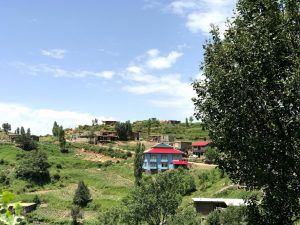
Photo credit: Shameem Hashmi
